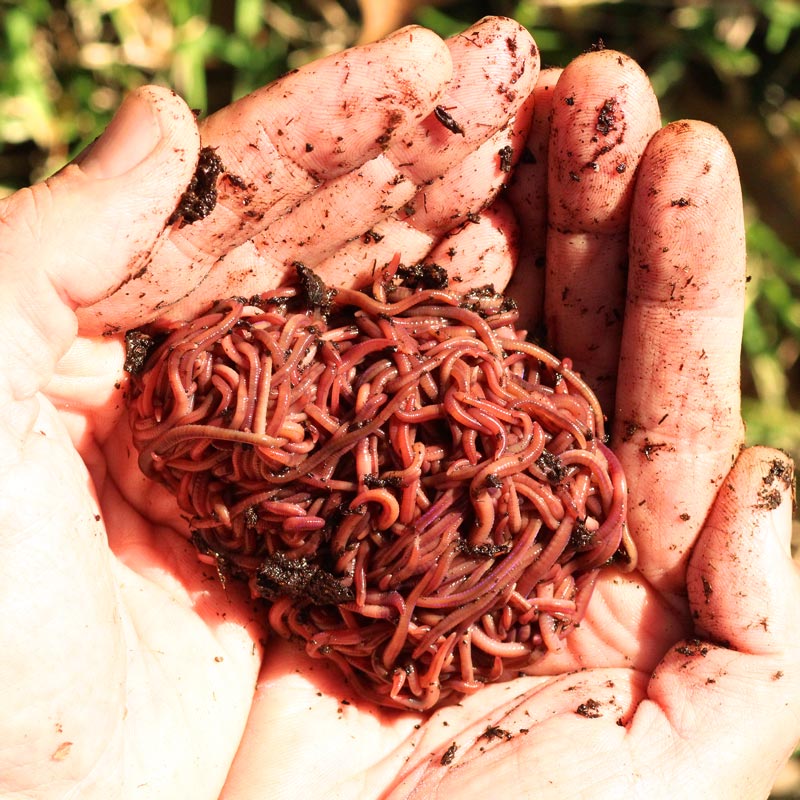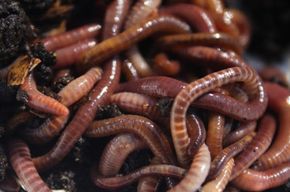Costs Top Quality Red Wiggler Worms - Boost Your Yard's Fertility
Wiki Article
Red Wiggler Worms Demystified: Opening the Tricks of Vermiculture for Greener Living and Nutrient-Rich Soil
In the realm of lasting practices for enhancing soil quality and promoting eco-conscious living, red wiggler worms play a pivotal yet often neglected duty. These simple creatures have the impressive capability to transform natural waste right into nutrient-rich castings that offer as a potent natural fertilizer. By diving into the globe of vermiculture, one can discover a huge selection of benefits that prolong much beyond traditional composting approaches. Comprehending the intricacies of looking after these worms, enhancing their environment, and using their spreadings can bring about a greener way of life and healthier dirt for plants to prosper.The Role of Red Wiggler Worms
Red Wiggler worms play a crucial duty in composting systems by efficiently breaking down natural matter into nutrient-rich spreadings. These voracious eaters consume a range of natural materials, such as kitchen area scraps, backyard waste, and paper items. As they feed, the worms' gastrointestinal procedures damage down the raw material right into a penalty, dark, and nutrient-dense material referred to as worm castings or vermicompost.The spreadings produced by Red Wiggler worms are highly valuable for soil health and plant growth. They are rich in important nutrients like potassium, nitrogen, and phosphorus, which are important for supporting healthy plant advancement. Furthermore, worm spreadings include helpful germs and enzymes that aid boost dirt framework, boost water retention, and boost nutrient uptake by plants.
Advantages of Vermicomposting

Moreover, vermicompost, the nutrient-rich output of vermicomposting, serves as an outstanding organic plant food and soil conditioner. It boosts dirt structure, enhances soil oygenation, and increases dirt moisture retention. These residential or commercial properties add to healthier plants with stronger origin systems and better resistance to conditions and bugs. Vermicompost additionally enriches the soil with necessary nutrients like phosphorus, potassium, and nitrogen, promoting plant growth and general dirt fertility.
Furthermore, vermicomposting assistances lasting horticulture techniques by providing a chemical-free and all-natural choice to artificial plant foods. Red Wiggler Worms. This eco-friendly technique not just improves the dirt yet also helps minimize dependence on unsafe chemicals, advertising a greener and more sustainable way of gardening
Setting Up a Worm Container
When establishing a worm bin for vermicomposting, correct configuration is essential to make certain the success of the composting procedure. The very first step in establishing up a worm container is choosing an appropriate container.After adding the bed linens, present the red wiggler worms to the bin. The worms need to then be provided with food scraps such as fruit and veggie peels, coffee grounds, and eggshells.
Routinely monitor the moisture degrees and temperature in the worm container to guarantee optimum conditions for the worms. With correct arrangement and upkeep, the worm bin will properly convert natural waste into nutrient-rich garden compost for your plants and yard.
Gathering Worm Spreadings
To successfully collect nutrient-rich worm spreadings from your vermicomposting system, a systematic harvesting approach is essential. There are a few key actions to comply with to guarantee an effective process when it comes time to gather the worm spreadings. Quit including fresh food scraps to one side of the worm container for a pair of weeks prior to harvesting. This motivates the worms to move sideways with fresh bed linen and food, making it less complicated to scoop out the castings from the opposite.
Troubleshooting Common Issues
Recognizing and addressing typical difficulties that might emerge during the vermicomposting procedure is essential for preserving a healthy and productive worm container. One typical problem that vermicomposters encounter is overfeeding. Adding excess food scraps can lead to a buildup of dampness and level of acidity in the worm bin, potentially damaging the check that worms. To stop this, feed the worms in small amounts, making certain that the food scraps are properly damaged down prior to adding more. An additional concern is unpleasant odors rising from the worm bin. Foul scents suggest anaerobic conditions, commonly caused by overwatering or inadequate ventilation. To treat this, change the dampness degrees by including dry bedding products like shredded newspaper or cardboard and rise aeration by transforming the bedding on a regular basis.
In addition, if the worm population is decreasing or the worms appear harmful, it might be as a result of environmental stressors such as severe temperatures or pH degrees. Monitoring these factors and making essential adjustments is crucial for the wellness of the worms. By fixing these common concerns promptly, vermicomposters can guarantee a effective and smooth vermicomposting process while preserving a thriving worm populace.

Verdict
In final thought, red wiggler worms play an important function in vermiculture by breaking down natural issue into nutrient-rich soil. Establishing up a worm bin is vital for effective vermiculture, and collecting worm castings provides useful garden compost for gardening.As they feed, the worms' gastrointestinal processes break down the organic issue into a penalty, dark, and nutrient-dense product understood as worm castings or vermicompost.
The spreadings created by Red Wiggler worms are highly beneficial for dirt health and wellness and useful reference plant development. Adding excess food scraps can lead to a build-up of wetness and level of acidity in the worm bin, potentially hurting the worms.Additionally, if the worm populace is decreasing or the worms appear undesirable, it could be due to ecological stressors such as severe temperatures or pH levels. Setting up a worm blog container is crucial for successful vermiculture, and collecting worm castings supplies important garden compost for horticulture.
Report this wiki page